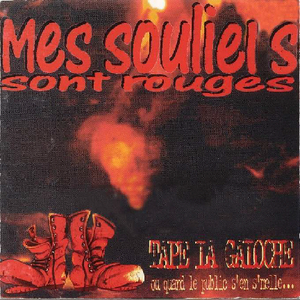It was born in 1991 in Caen, Normandy. They play amusing and/or traditional songs inspired by Quebec songs. They started by singing real traditional songs and then invented new ones.
The band has a great experience of the scene and usually invite people to dance and participate.
Today, since François Boros is gone, there is no more any initial creator of the band, Emmanuel (Manu) Savinelli, Dominique Adrix (Jimi) and François Boros.
December 2006, they decided to stop (at least for a moment) their common activity, to continue each one alone.
John Kalak
Mes souliers sont rouges Lyrics
Jump to: Overall Meaning ↴ Line by Line Meaning ↴
John kalakalaka tou la hé
Quelqu'un criait paré à virer
John Kalakalaka tou la hé
{Refrain :}
Tou la hé oh tou la hé, John kalakalaka tou la hé {x2}
John Kalakalaka tou la hé
Par un bosco qui l'avait soulé
John Kalakalaka tou la hé
{au Refrain}
A bord ton temps tu l'passe à étarquer
John Kalakalaka tou la hé
C'est pas l'capt'ain qui monte dans les huniers
John Kalakalaka tou la hé
{au Refrain}
Par le Cap Horn trois fois il est passé
John Kalakalaka tou la hé
Et rien qu'une fois son sac il a posé
John Kalakalaka tou la hé
{au Refrain}
Mais des baleines y z'ont en pas troué
John Kalakalaka tou la hé
Y'a que l'sale temps qui z'ont harponné
John Kalakalaka tou la hé
{au Refrain}
Mais aux Marquises l'enfer c'est terminé
John Kalakalaka tou la hé
Dans les bras d'la goélette la mieux gréée
John Kalakalaka tou la hé
{au Refrain}
John est heureux avec sa vahiné
John Kalakalaka tou la hé
C'est pas demain qu'y va réembarquer
John Kalakalaka tou la hé
{au Refrain, x2}
The song "John Kalak" by Mes Souliers sont Rouges is about the titular character, John, who wakes up on a whaling ship and ends up being enlisted by a bosco in a tavern. The refrain "tou la hé" adds to the sea shanty feel of the song. The lyrics describe John's experiences aboard the ship, including working hard to raise the sails and not seeing the captain climb up to the mast. The song notes that John has passed through the treacherous Cape Horn three times and has only rested once along the way. Despite being aboard a whaling ship, they have not been successful in hunting whales, as they have only been caught in inclement weather. However, John's journey ends happily in the Marquesas Islands where he finds love with a vahiné and decides not to embark on any more voyages.
The lyrics of the song are a tribute to the sea shanties sung by sailors on board whaling ships in the 19th century. The repetitive refrain "tou la hé" is a form of call and response used by sailors to coordinate their work. The song captures the harsh realities of life at sea, including the grueling labor required to raise the sails and the dangers of rounding Cape Horn. The mention of the Marquesas Islands in the final verse refers to a group of islands in French Polynesia that were an important stopover for whalers in the 19th century.
Line by Line Meaning
Sur un baleinier John s'est réveillé
John woke up on a whaling ship
Quelqu'un criait paré à virer
Someone was shouting to be ready to turn
Dans une taverne il s'est fait enrolé
He was recruited in a tavern
Par un bosco qui l'avait soulé
By a boss who had drunk too much
A bord ton temps tu l'passe à étarquer
On board, your time is spent hoisting
C'est pas l'capt'ain qui monte dans les huniers
It's not the captain who climbs up the masts
Par le Cap Horn trois fois il est passé
He passed by the Cape Horn three times
Et rien qu'une fois son sac il a posé
And only once did he put down his bag
Mais des baleines y z'ont en pas troué
But they didn't find any whales
Y'a que l'sale temps qui z'ont harponné
Only the bad weather was harpooned
Mais aux Marquises l'enfer c'est terminé
But in the Marquesas, hell was over
Dans les bras d'la goélette la mieux gréée
In the arms of the best rigged schooner
John est heureux avec sa vahiné
John is happy with his native girl
C'est pas demain qu'y va réembarquer
He's not going to re-embark tomorrow
Contributed by Gabriel K. Suggest a correction in the comments below.
